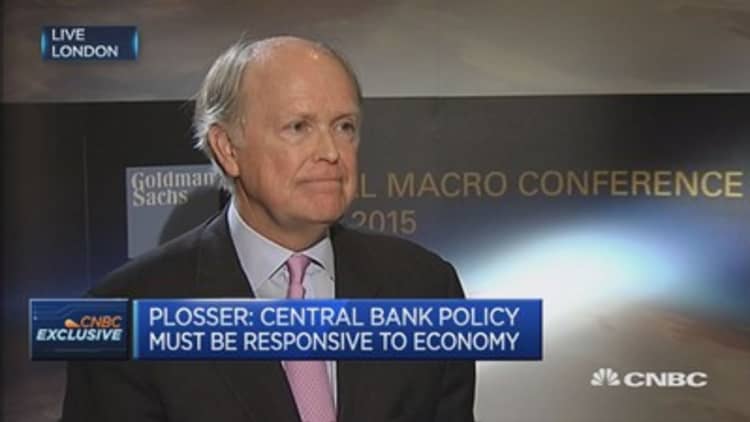Being a U.S. Federal Reserve governor is an impressive job, but sometimes you might wish for another, simpler, task—like working for the European Central Bank (ECB).
At least to Charles Plosser, the former president of the Philadelphia Fed, it's that single mandate that's attractive. While the U.S. central bank must aim to achieve both maximum employment and stable prices, its euro zone counterpart need only worry about the latter.
"I am jealous of the ECB's mandate," Plosser told CNBC on Monday. "I would rather see the U.S. have a more narrow mandate that looked like the ECB's mandate, actually. I think that would make the task easier and make monetary policy more effective doing what monetary policy is actually capable of doing, which is achieving price stability."
Plosser also said that the Fed was overdue for a policy change. The U.S. central bank is seen raising interest rates off record lows later this year—Goldman Sachs forecasts hikes in September and December—but Plosser hinted that the time had already come.
"Why do we continue to have monetary policy that is calibrated at the same level that we had in the depths of the financial crisis? That just doesn't seem quite right to me. We need to adjust. We need to be responsive to the economy. As the economy improves, policy ought to change," he told CNBC.
His comments came after the International Monetary Fund said earlier in the day that U.S. rate increases could destabilize markets when they finally occur.
Plosser was unimpressed by the warning, telling CNBC, "I should be careful what I say about the IMF, but they want to be central bankers—and they're are not."

He added that delaying a hike could prove problematic, because it increases the risk of the Fed being forced to raise rates more steeply than ideal.
"My own view is that the longer they wait to begin rate hikes, the greater risk that they will have to raise rates faster. That will create volatility. Better to start sooner and give us a better chance to do it smoothly. If the markets get ahead then we are going to have to chase rates up and that would not be a good situation," Plosser told CNBC, from the annual Goldman Sachs global macro conference in London.
Read MoreWhy a Fed rate hike won't dent the surge in M&A
Jan Hatzius, chief economist of Goldman Sachs, described the forecast two rate hikes in 2015 as "pretty slow."
"That is a pretty slow pace by historical standards and even relative to that base line, I think, at least in the early stages, the risks are probably still on the side of it being even slower than that," Hatzius told CNBC, also from the Goldman Sachs conference in London.
For more from the Goldman Sachs conference read:

